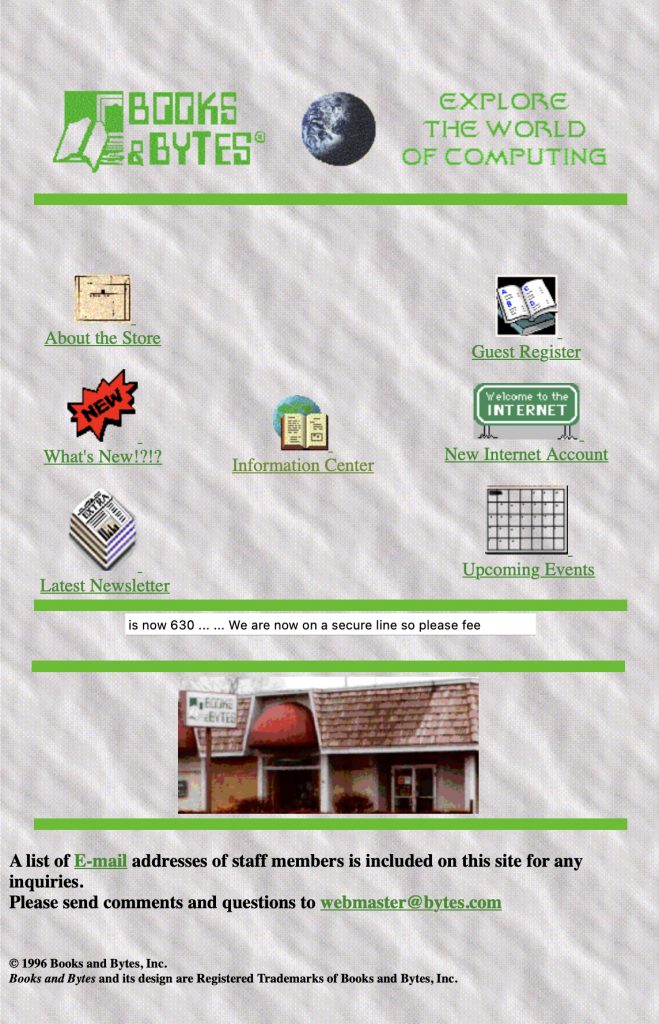Earlier this week on Twitter a contemporary asked, of those of us who came of age during (or before) the Web, what was our first job working with it?
Webmaster for a computer bookstore in the Chicago suburbs in 1996. Books & Bytes, domain was https://t.co/n0ejgf1JOI. Needless to say, I should have picked up the domain when the store closed.
— Paul Weinstein (@pdweinstein) February 4, 2021
For me, that first job was running the website for a computer bookstore in the Chicago suburbs (Naperville) called Books & Bytes which I started maintaining around 1995/6.1
Books & Bytes wasn’t the only business selling books online, Amazon had already been online for a couple of years by then. In fact, I can still recall customers suggesting to one of the business owners how we could be like Amazon.
If only, right? After all, we already had the domain bytes.com.
Here’s the thing, it was never really in the cards. First off, the business partners, Cathy and Ross, were not interested in building a business empire. Prior to running Books & Bytes, Cathy had been a programmer and Ross was still a full-time computer scientist at Argonne National lab.2 To put it in current terms, this was their side hustle. And, as a full-time undergraduate in computer science at nearby Elmhurst, it was my side hustle as well.
But the real point is that while Book & Bytes’ online, mail order business would have seemed tailored made to challenge an early Amazon, the business was built on supplying institutional libraries with technical publications for their staff.
For example, Steven Sinofsky, former President of Microsoft’s Windows Division, recalls when he started at Microsoft in the early 90s his new office bookshelf was “was pre-populated with, I later learned, standard-issue books for every new software design engineer hire.” that an internal email alias went to librarians for which “any topic to research or a request to send copies of articles or locate any book needed for work” and that “there was an actual library filling most of one arm of an X in building 4, where I spent a lot of time as well.”3 4
In the case of Books & Bytes, it supplied the libraries of Motorola, Argonne and other large, highly specialized organizations located/headquartered in Chicago and its suburbs.
If Books & Bytes had simply translated their business model online, they would still no longer exist as a business today. Recall, Tim Berners-Lee‘s vision for the Web included creating a place for global information sharing.
In a world where the popular publisher O’Reilly now runs an online learning platform, why would an engineer need a book? Why would a scientist need a print copy of a scientific journal when they are indexed and searchable online?
All of which means Jeff Bezos gets to retire as one of the richest people in the world and I get to reminisce about a non-existent alternate universe.

1 I’m reminded of the scene in Wayne’s World 2 in which The UNIX Network Programing book appears in. As fictional residents of neighboring Aurora, Garth and his girlfriend would have purchased their copies at Books & Bytes.
2 Among other items, Ross Overbeek co-authored the book Assembler language with ASSIST, which was a common textbook used in various computer science programs, including mine.
3 Hardcore Software, Steven Sinofsky, https://hardcoresoftware.learningbyshipping.com/p/002-stevesi
4 In fact, Microsoft itself published technical publications under its own book label, Microsoft Press